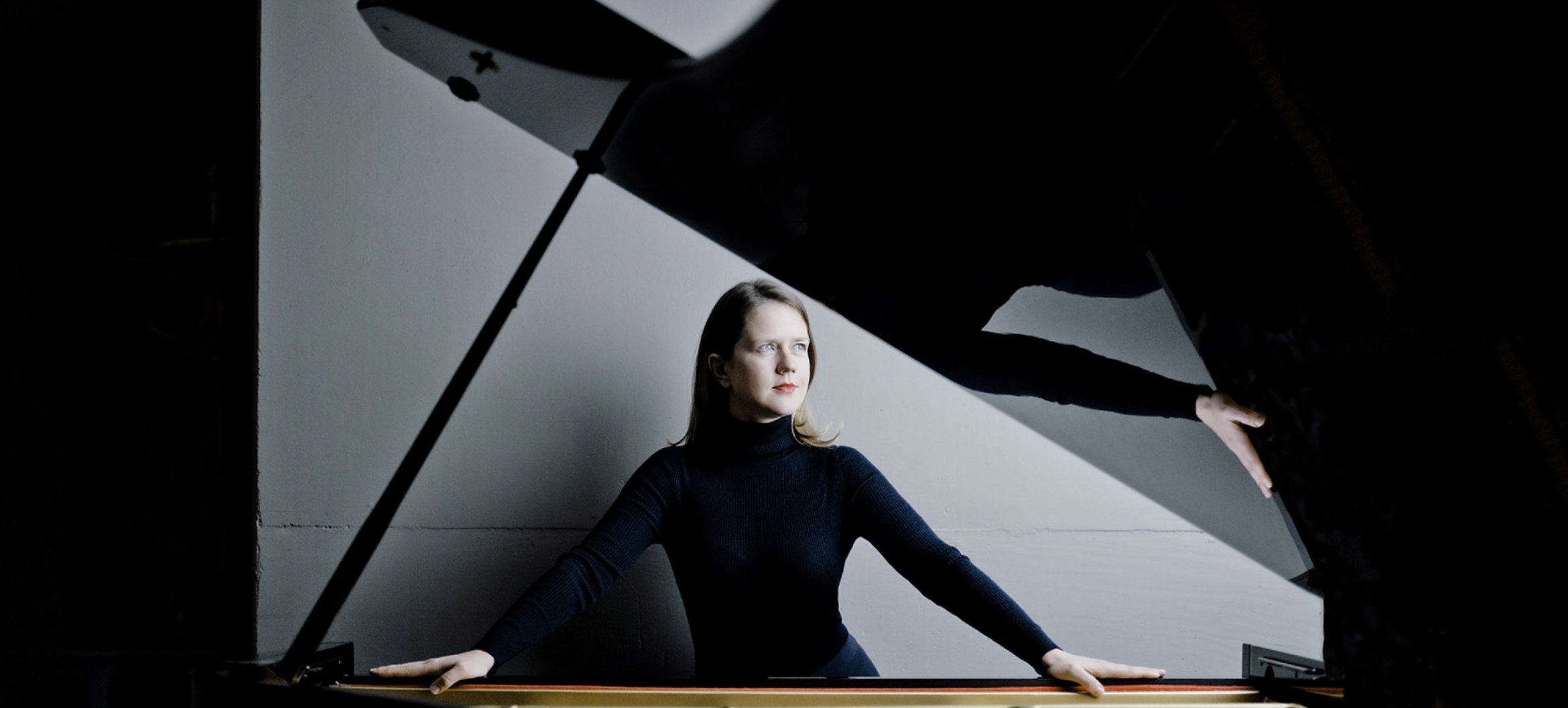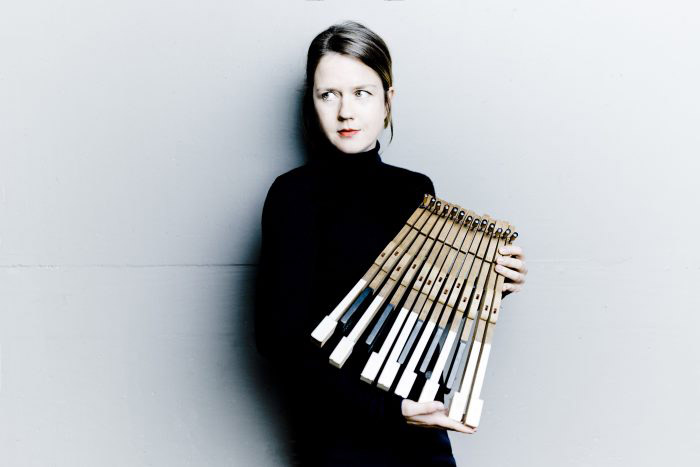The Journey of Helena Basilova
Every career in the arts follows a different path. The Journey of is the ArtEZ Business Centre's series in which teachers share the key moments in their professional lives. In a classroom setting, we often lack the time to talk about these personal histories. Find out what choices they made and how they got where they are today.

Helena Basilova (1983) is a classically trained pianist, whose music has struck a chord both in the Netherlands and internationally. Her work mixes the old world of her Russian ancestors with the technology of modern composition. She has played, among other places, in New York, Japan, Moscow and Mumbai. Since 2016, she has been teaching piano at the conservatory of ArtEZ Zwolle. Lars Meijer and Tim Bongaerts interviewed her and penned down the following key moments from her career.
1983: Everything starts at home
My parents were both pianists, so classical music was part of my life from infancy. It's hard to imagine now, but as a young child, I was truly convinced that everybody played the piano. There was always music being played at home and I started piano lessons when I was five years old. From that moment on, it was such a big part of my life that I never imagined a different career path.
Lesson: Nobody can decide the circumstances of their birth. It was a great privilege to grow up in such a musical family. I would press upon everyone to let yourself be led by your passions. My intrinsic love of music has always given direction to my life.
1988 - 1990: Russian discipline
I was born in Russia and had two hours of piano class a week there, as well as an hour of ear training and an hour of choir practice. Russian culture is quite different from Dutch culture when it comes to music classes. The lessons are at a higher level and there's a strong national appreciation of the value of art. My Russian discipline proved valuable during a recent quarantine. When we were forced to stay at home, I could have stretched out on the sofa and watched Netflix, but instead I recorded an album.
Lesson: Don't focus on your limitations but think about what is possible. Even if you're having difficulty concentrating, there are ways to invest in your practice.

1990: Moving to the Netherlands
My parents spent a lot of time away from home, so I was forced to develop a strong sense of independence early. Some parents might get babysitters for their children until quite an advanced age, but mine were nothing like that! I taught myself Dutch and was thrown in the deep end many times. I often had to depend on my own discipline to keep playing the piano. If there is nobody else to tell you to get to work, you will have to do it yourself. Doing things alone can strengthen your sense of autonomy.
Lesson: Don't be afraid to take risks. You can fail, but you can still learn a lot from it. A new project often speaks its own language, and what better way to learn it than by living in it?
2001: A self-evident choice
When I was 18, I applied to the Conservatory of Amsterdam. That felt – and still feels – like a self-evident choice. It was the route I had mapped out for myself as a kid. During my MA, my father passed away. His death only strengthened my resolve to play the piano. The music of my childhood, his discipline, my training: it was where it all came together.
Lesson: The step to the Conservatory was a logical one for me, but it didn't mean I was living on autopilot. It's important to keep developing yourself and regularly reconsider your plans. By remaining critical and thinking for yourself, you grow as an artist and as a person.
2008-2009: Life abroad
After my studies, I lived in London and Berlin. My life there allowed me to broaden my view of music. I immersed myself in performances in big concert halls and smoky basements alike. One particularly memorable performance was given by a guitarist in a half-empty room, unleashing an electric razor on his guitar strings. I didn't understand why, but his drive for experimentation stayed with me. In every performance, there is something you can apply to your own work.
Lesson: Look beyond your (musical) bubble! A classical pianist like me can learn a lot from a jazz player, and vice versa. It's often the artists outside of our own disciplines that can have a great influence on our work.

2008: Dutch Classical Talent
In 2008, I won the Debut Tour Award (now the Dutch Classical Talent award & tour), for which I toured the country for two weeks and performed in every major concert hall in the Netherlands. The tour taught me what it means to spend a lot of time with a piece, and how that can improve your performance. When you play the same programme many times, there's more time and space to focus on the details. What I didn't know yet, at the time, was the importance of networking. I met so many people, and in retrospect I should have written down more e-mail addresses and phone numbers.
Lesson: Some aspects of entrepreneurship I only learned late in life. I could have picked up the networking earlier, but at that time, it didn't feel like the most important thing. The most important lesson I took away from this tour was the value of slow improvement by playing your work many times. The more time you spend with a piece, the better it becomes, not just for you, but also for your performance.
2012: New York and The New York Times
I was on holiday in Spain when I met a music teacher who taught at New York University. We got along well, and he invited me to come study with him. It turned my holiday into a sudden coming-of-age moment. NYU is a prestigious school, so I spent the rest of the year applying for scholarships and preparing for my audition. When I got accepted, I experienced my time in New York as a tremendously liberating one. So much is possible in that city, and it gave me a lot of energy. I won a competition, after which I got to play in Carnegie Hall with an orchestra. The performance was even mentioned in the New York Times: ‘Helena Basilova played sensitively and with flair’. It was a huge, unforgettable moment for me. In retrospect, I was far too modest at the time. The cost of the tickets stopped me from sharing my performance online. These days, I'd post it all over my timeline.
Lesson: Don't be too modest when you achieve something with your passion. Sharing your work allows you to enlarge your network. Self-profiling and name recognition are an important part of entrepreneurship. You will benefit from that later.
2013-2021: Positioning and network
In New York, it was difficult to make a living with my music. Pay for musicians was quite low, so I decided to return to the Netherlands to pursue a musical career. Once I returned, I started to think about my position in the classical music landscape. Five years after graduating! Coming back from the US felt like I had to start from scratch. Nobody knew I was back, so I had to start e-mailing people myself. This would have been the time to tap into my old network, but it was very limited. In these years, I learned to invest time in projects that give back. It's like a ripple effect: by doing things you love, similar jobs will find their way to you.
Lesson: It's obvious to me why I make music and what it means to me. I always carry this with me, whether I'm successful or not. I'm convinced that if you believe wholeheartedly in your work, nothing bad can happen to you. Don't be afraid to create what you find interesting. There is always an audience out there that will share your interest.
My musical career is a combination of random circumstances. My parents, my education, my independence, and the coincidences in my life cultivated a deep faith in music and a clear reason to play it. It will always be part of my life, even if I didn't make a penny with it. I surround myself with people who keep challenging me. The most important thing remains not to plan too much. Life has a plan of its own.
Follow Helena
Please find the key moments of other ArtEZ teachers on our page Teachers and their professional practice


